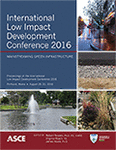International Low Impact Development Conference 2016
Addressing Water Scarcity in South Africa through the Use of LID
Publication: International Low Impact Development Conference 2016: Mainstreaming Green Infrastructure
ABSTRACT
By 2030 the Republic of South Africa (RSA), a developing country, is predicted to be severely impacted by physical water scarcity. 2015 was one of the driest years on record, leaving many towns with extremely compromised water supply systems whilst also limiting food production across the country. This is placing pressure on the already fragile economy. In order to avert a future water crisis, the country needs to reduce its reliance on conventional surface water schemes based on impoundments on rivers. This paper presents an initial assessment of the potential role of low impact development (LID) for the purposes of stormwater harvesting (SWH) and describes the principal outcomes from two RSA case studies. The findings suggest that SWH could substantially increase the supply of water to urban areas, but that there are a number of barriers to its wider use that need to be addressed. The paper concludes with three “position statements” describing how SWH, with the assistance of LID, can contribute to: improving water security and increasing resilience to climate change in urban areas; preventing frequent flooding; and providing various other additional benefits such as amenity and the preservation of biodiversity.
Get full access to this article
View all available purchase options and get full access to this chapter.
REFERENCES
AMEC, Center for Watershed Protection, Debo and Associates, Jordan Jones and Goulding, & Atlanta Regional Commission. (2001). Georgia Stormwater Management Manual Volume 1: Stormwater Policy Guidebook First Edition. United States of America. Retrieved from http://www.georgiastormwater.com/.
Armitage, N., Vice, M., Fisher-Jeffes, L., Winter, K., Spiegel, A., & Dunstan, J. (2013). South African Guidelines for Sustainable Drainage Systems (WRC Report: TT558/12). Water Research Commission (South Africa). South Africa. ISBN: 09781431204137.
Brown, R. R., & Farrelly, M. A. (2009). Delivering sustainable urban water management: A review of the hurdles we face. Water Science and Technology, 59(5), 839-846. ISBN: 0273-1223 (Print). ISSN:.
DECNSW. (2006). Managing Urban Stormwater: Harvesting and Reuse. Department of Environment and Conservation NSW. Sydney South, Australia. Retrieved May 22, 2012 from www.environment.nsw.gov.au.
Duncan. (1995). A review of urban stormwater quality processes. Cooperative Research Centre for Catchment Hydrology. Australia. ISBN: 1876006064. Retrieved June 26, 2012 from http://www.ewater.com.au/archive/crcch/archive/pubs/pdfs/technical199509.pdf.
DWAF. (2010). The Atlantis Water Resource Management Scheme: 30 years of Artificial Groundwater Recharge. Department of Water Affairs and Forestry. Pretoria, South Africa.
Ellis, D., Armitage, N. P., & Carden, K. (2016). Effective Water Sensitive Design Drivers And Barriers. In Water Institute of South Africa (WISA) Biennial Conference. Durban, South Africa.
Evans, A. (2007). River of Life: River Liesbeek. Rivers of the World, Thames Festival Project. Retrieved from http://totallythames.org/images/uploads/documents/River of the World Info Packs/River_Liesbeek_South_Africa.pdf.
Fisher-Jeffes, L. (2015). The viability of rainwater and stormwater harvesting in the residential areas of the Liesbeek River Catchment, Cape Town. University of Cape Town.
Fisher-Jeffes, L., Carden, K., Armitage, N. P., & Winter, K. (n.d.). Stormwater harvesting: Improving water security in South Africa ’ s urban areas.
Fisher-Jeffes, L., Carden, K., Armitage, N., Spiegel, A., Winter, K., & Ashley, R. (2012). Challenges Facing Implementation of Water Sensitive Urban Design in South Africa. In 7th Conference on Water Sensitive Urban Design (pp. 1-8). Engineers Australia. Melbourne, Australia, Australia. ISBN: 9780858258952.
Lee, J., Pak, G., Yoo, C., Kim, S., & Yoon, J. (2010). Effects of land use change and water reuse options on urban water cycle. Journal of Environmental Sciences, 22(6), 923-928. ISSN:. Retrieved from http://linkinghub.elsevier.com/retrieve/pii/S1001074209601996.
Lim, M. H., Leong, Y. H., Tiew, K. N., & Seah, H. (2011). Urban stormwater harvesting: A valuable water resource of Singapore. Water Practice and Technology, 6(4). ISBN: 1751-231X. ISSN:.
Makepeace, D. K., Smith, D. W., & Stanley, S. J. (1995). Urban stormwater quality: Summary of contaminant data. Critical Reviews in Environmental Science and Technology. ISBN: 1064-3389. ISSN:. Retrieved July 27, 2014 from http://www.tandfonline.com/doi/abs/10.1080/10643389509388476.
Marsalek, J., Karamouz, M., Goldenfum, J., & Chocat, B. (2006). Urban water cycle processes and interactions. International Hydrological Programme (IHP) of the United Nations Educational, Scientific and Cultural Organization (UNESCO).
Murray, E. C., & Tredoux, G. (2004). Planning water resource management: The case for managing aquifer recharge. In 2004 Water Institute of Southern Africa (WISA) Biennial Conference (pp. 430-437). Cape Town, South Africa (2–6 May 2004). ISBN: 1920017283.
Pandey, D. N., Gupta, A. K., & Anderson, D. M. (2003). Rainwater harvesting as an adaptation to climate change. Current Science, 85(1), 46-59.
Philp, M., Mcmahon, J., Heyenga, S., Marinoni, O., Jenkins, G., Maheepala, S., & Greenway, M. (2008). Review of Stormwater Harvesting Practices Urban Water Security Research Alliance Technical Report No. 9. Urban Water Security Research Alliance Technical Report No. 9. ISSN:.
Tjandraatmadja, G., Cook, S., Chacko, P., Myers, B., Sharma, A. K., & Pezzaniti, D. (2014). Water Sensitive Urban Design Impediments and Potential: Contributions to the SA Urban Water Blueprint - Post-implementation assessment and impediments to WSUD. Goyder Institute for Water Research. Adelaide, Australia. Retrieved March 21, 2016, from http://www.goyderinstitute.org/uploads/WSUD_Task1_Final_web.pdf.
UN. (1992). The Dublin Statement on Water and Sustainable Development. . Report from International Conference on Water and the Environment (ICWE). Retrieved May 25, 2012, from http://www.wmo.int/pages/prog/hwrp/documents/english/icwedece.html.
USEPA. (2012). Low Impact Development (LID). United States Environmental Protection Agency. Retrieved May 23, 2012, from epa.gov/owow/NPS/lid/
Wright, A. (1996). Urban Stormwater, Correctly Managed, is a resource rather than a nuisance. In Water Institute of South Africa 1996 Biennial Conference & Exhibition Port Elizabeth. Water Institute of South Africa.
Information & Authors
Information
Published In
International Low Impact Development Conference 2016: Mainstreaming Green Infrastructure
Pages: 20 - 28
Editors: Robert Roseen, Ph.D., Waterstone Engineering, Virginia Roach, CDM Smith, and James Houle, Ph.D., The University of New Hampshire
ISBN (Online): 978-0-7844-8054-0
Copyright
© 2017 American Society of Civil Engineers.
History
Published online: Oct 11, 2017
Authors
Metrics & Citations
Metrics
Citations
Download citation
If you have the appropriate software installed, you can download article citation data to the citation manager of your choice. Simply select your manager software from the list below and click Download.
